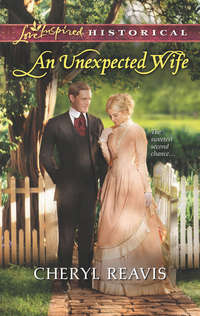
Полная версия
The Bartered Bride
“The sun is up! There is work to do! Where is Eli?”
Her hair was coming down, and it suddenly penetrated that his new wife was fully dressed and still wearing her shawl and that the bed had been slept on, not in. She sat up slowly and stared at him. Her eyes were big and afraid like a child’s, like Mary Louise’s when Beata scared her with witch stories about the cruel Eisenbertha.
But she took her own time about answering. “I don’t know.”
“You don’t know where he is?”
“I’ve said I don’t know! I haven’t seen him since—” She broke off, and looked away, as if she had to shore up her courage. “Since yesterday,” she said, looking him directly in the eyes again. “He didn’t spend the night here, if that’s what you think.”
Taken aback by her bluntness, Frederich stood for a moment, then abruptly left the room, slamming the door behind him.
Now what? he thought as he clambered down the stairs. Where could Eli be? He wasn’t in the barn—none of the animals had been tended. The cows hadn’t been milked. The kitchen fire hadn’t been lit. Between Eli’s disappearance and Beata’s sulking, nothing had been done this morning. The north field had to be plowed and his children hadn’t been fed—and wouldn’t be at this rate.
He crossed the cold kitchen and opened the back door.
“Eli!” he yelled into the backyard, as if he hadn’t already looked. He listened for a reply, but he could only hear the crows in the pine tops at the edge of the field and the lowing of miserable, unmilked cows.
He turned and went back into the kitchen, and was startled to find Caroline Holt standing there.
“Are the children still asleep?” she asked.
He didn’t answer her.
“Why, yes, Caroline,” she answered for him. “The children are still asleep. Why don’t you build a fire so the kitchen will be warm when they come down? Perhaps you could even cook them a little Frühstück since they’ve only had milk and corn bread since yesterday.
“What a fine idea, Frederich,” she continued, her sarcasm the kind born of years of practice. “I understand it may be some time before Beata decides to participate in the household again. But you see, I don’t quite know what to do with such a huge fireplace. Perhaps if you would deign to instruct me—for the sake of your children—I could accomplish—”
“You find this amusing?” Frederich cut in. By God, she was a sharp-tongued woman, whether she was afraid of him or not. No wonder her brother had beaten her—except he was certain Avery Holt hadn’t beaten her for her sarcasm. He’d beaten her for the child she carried. For ruining his dream of finally owning the acre of land with a spring he’d begged the use of these past eight years.
“Oh, no, Frederich,” she said. “I don’t find this amusing. I find this a living hell.“
Frederich turned abruptly and went outside before he laid hands on her in spite of his promise. He was angry enough to do it, to grab her and shake her until all that superiority and arrogance dropped away. She was not his better, regardless of her fine education and her airs. He knew that she had never considered him a fit husband for Ann—but Caroline Holt had been tumbled by a man she was clearly too ashamed to name. She was like any other briar patch whore in the county, and she’d do well to remember that.
The horses rumbled a greeting when he flung open the barn door, blowing heavily and leaning out over their stalls to nudge him as he passed by. But he left them standing. He had to put the cows out of their misery first.
The milking rapidly grew into yet another aggravation, because his barely controlled anger made the cows as testy and uncooperative as he felt. The wind the past few days would have dried the ground, making it just right for plowing—and here he was doing Beata’s job. Caroline Holt had been right about one thing. This was going to be a kind of hell—living in the same house with her and Beata. He ignored the fact that just such an arrangement had been his original plan and that he had once looked at Caroline Holt with a certain longing. He couldn’t deny that he found her attractive enough for his taste and that her aloofness both annoyed and intrigued him. He had never wanted a docile wife. He had wanted this marriage to make his children happy, and, in time, he had wanted to be vindicated as a man worthy of her regard and not some ignorant foreigner.
It was only when he remembered the way Ann had died that he knew the true reason for his seeking to wed her sister. He still felt the sting of Ann’s betrayal as sharply as if it had been yesterday. He cursed the day his older brother had sent Eli here to America. Eli, who had taken half the land and Frederich’s young wife. Frederich tried not to remember the look in Ann’s eyes every time she spoke Eli’s name. The question had never been whether Ann had loved Eli Graeber. The question had been how much. He knew the answer to that now, but Ann was no longer here to atone for the wrong she’d done, and it hadn’t been enough for him that she had died giving birth to Eli’s child. He still needed reparation, and Caroline was the person Ann loved best. After her children. After Eli. If he, Frederich, married her, he could make her suffer for Ann’s transgression without remorse. He could insist that she be a good German wife. He could keep her pregnant—there would be no time for books and poetry and fine airs. How Caroline would hate that, and how Ann would have hated it for her.
But the actual marriage yesterday had somehow changed everything. Caroline was in his household as a wife and therefore legally and morally subject to his will, but she was also a helpless outcast in need of his charity, beloved by his children no matter how disdainful she was’of him. He didn’t like the turn his emotions had taken. Perhaps it would have been better to let Eli—
Where is Eli, damn him?
Off somewhere feeling sorry for himself—again, he thought.
Frederich’s abrupt fit of agitation startled the cow, and she bellowed loudly, kicking over the nearly full milk pail before he could catch it. He swore and watched helplessly as the barn cats rushed forward to make the best of his misfortune before the milk seeped into the ground.
He could hear Lise and Mary Louise calling him. He left the bucket sitting and he stepped outside. They descended upon him immediately, grabbing him by the hand and pulling him along, chattering as they went. He entered the house fully expecting to find the kitchen on fire.
A meal had been laid out on the table instead—bread and cheese, jam and butter. Bacon and boiled eggs.
“Look what we made, Papa!” Lise said, pulling out his chair. “We only had two things to burn.”
“Three,” Caroline said, lifting Mary Louise into a chair. “The bacon caught fire twice. I couldn’t find the coffee,” she said, turning back to the hearth.
He hesitated, looking at her warily, as if there was some devious purpose behind all this. She glanced at him over her shoulder, and after a moment, he sat down.
“I cooked the bread, Papa,” Mary Louise said, grinning around the two fingers she had in her mouth. He reached to pull them out before she ruined her fine teeth.
“She means she found the bread. Beata hid it in the pantry,” Lise said. “We thought the water for the eggs would never boil, didn’t we, Aunt Caroline?”
“Never,” Caroline agreed without looking up from the hearth. She’d shed her shawl, and her face was flushed from working so close to the fire. She struggled with an iron pot, and Frederich tried not to look at the way her breasts moved under the bodice of her ugly yellow-flowered dress.
There were only three places set. Apparently, Caroline had not intended to join them, nor did he invite her. He lost himself in conversation with his daughters, listening to their convoluted story of how such a fine Frühstück had come about.
“Beata’s going to be upset,” Lise said.
“Beata is always upset,” he said, spreading more jam on a huge slice of bread.
“But she’s going to say we took bread she was keeping for something else.”
“For what?” Frederich asked with his mouth full.
“She never says that part,” Lisa answered, and he laughed.
“Don’t worry, little one. If Beata wants to hoard her bread, then she must come down here and guard her kitchen herself. The biggest trouble with sulking, you see, is while you’re off hiding with your long face, life will go on without you. If she stays away, there’s no telling what we might do with the rest of the food in the pantry—we might even find where she hides the coffee,” he added in a whisper.
He was smiling—until he glanced at Caroline. Then he was immediately reminded of what a disaster this morning had been.
He abruptly got up from the table. “I have too much to do,” he said, the reproach in his voice apparent even to him. He took another hunk of the ill-gotten bread and a slice of bacon with him. He had stayed in the company of his children and Caroline Holt too long. He had nearly let his anger dissipate, and he needed it if he was going to plow the north field and locate his good-for-nothing nephew.
He went back to the barn. He tossed the last bit of bacon and bread to the barn cats, and he climbed the ladder to the hayloft, fighting off a fit of sneezing that came from the dust and the pungent scent of the hay. He stood for a moment peering into the dark corners for Eli’s sleeping form. If Eli hadn’t gone to Caroline, then he had to have slept somewhere.
The loft was empty, and Frederich began pitching the hay into the stalls below. The cats mewed loudly for another handout, and Beata was awake. He could hear her complaining all the way out here.
He moved to the other side and looked over the edge. The door to the stall directly below him stood ajar, and the bay gelding that should have been there was gone.
Frederich stayed away from the house until shortly after noon. The kitchen was quiet when he came in, and he was surprised that there was no meal on the table. Even if Beata was still sulking, he expected Caroline to have at least managed something for the children. He didn’t see the girls anywhere, but she was sitting on the bottom step of the stairs.
“We observe the Mittagessen in this house,” he said.
She looked at him blankly.
“The noon meal,” he said as if to a backward child.
“Lise and Mary Louise have eaten.”
“Is there anything left?” he asked pointedly.
“I don’t know. Beata took it.”
“Took it where?”
“I don’t know,” she said again.
He swore under his breath and went looking for whatever Beata might have put aside for him—or missed hiding. There was nothing. He looked up from his search to see Caroline standing nearby.
“Have you…found Eli?” she asked, not quite meeting his eyes.
“One of the horses and a saddle is missing. Eli had some money put by. I expect he is long gone.”
“Oh,” she said, as if she hadn’t considered that possibility.
When he looked up again, she was putting on her shawl and opening the back door. “Where are you going?”
He saw the rise and fall of her breasts as she took a deep breath before she answered him.
“This—marriage—isn’t going to work. I’m going to ask Avery to let me come home.”
The remark took him completely by surprise, and his temper flared. He had given her the only chance she would ever have for any kind of respectability and she was about to throw it away?
“Avery will not let you come home,” he said bluntly.
“You don’t know that—”
“He made too much of a show among the men of disowning you.”
He walked into the pantry looking again for something Beata might have forgotten to hide. He supposed that the loss of her secret hoard of bread must have convinced her as nothing else could that the rest of them hadn’t suffered enough from her self-imposed absence. Certainly it would be much more difficult to cook and eat without her if no one could find any food. He wondered what terrible thing he had done in his life to deserve Beata. And Eli. And Caroline Holt.
When he came out of the pantry, Caroline was no longer in the room. He leaned over the table to look out the window. She was walking across the field he should have had plowed by now, her gait strong for a few steps then hesitant, as if she were being forced to give in to the pain she still had from Avery’s beating.
Good riddance, he thought. Let her grovel in front of Avery. And when he sent her back again, perhaps she would understand her situation better.
He looked around at a small noise. Both his daughters stood at the bottom of the stairs.
“Papa?” Lise said tentatively. “Did you let Aunt Caroline go?”
He sighed. “She went, Lise. There was no letting or not letting.”
“Aren’t you…worried? Uncle Avery—he might hurt her again, Papa. And we promised.”
“Lise, I can’t tie your Aunt Caroline to the kitchen table so she’ll stay here,” he said, trying not to be influenced by how hard she was trying not to cry. Lise was a gentle soul; she was concerned about all living creatures—whether they deserved it or not.
“Eli said we wouldn’t let anyone hurt her again. He promised, Papa.”
“Lise, there is nothing I can do,” he said, in spite of the fact that he’d made the same promise himself.
“Couldn’t you just—?”
“This is not your business.”
Mary Louise was tugging on his trouser leg. “What is it, Mary Louise?” he said more sharply than he intended.
“I think we might cry, Papa,” she advised him.
“Then you’ll just have to cry. Life is full of crying. I can’t fix everything.” He was very careful not to look into her upturned face, into those begging Holt-brown eyes.
“Can’t you please just fix this, Papa?” Lise asked. “Don’t let Uncle Avery hurt her again. Please, Papa! All you have to do is just stand there while she talks to him—he wouldn’t hurt her if you stood by. I know he wouldn’t!”
Her mouth trembled, but she worked hard not to give in to it. Clearly, Lise expected him to stand guard indefinitely.
“Your Aunt Caroline left by her own choice—”
“No, she didn’t, Papa! She left because Beata is going to be mean to everybody if she stays. Papa—”
He held up his hand to stop her.
“You don’t worry about your Aunt Caroline. You don’t worry about any of those people over there.”
Caroline heard the back door slam, and Frederich caught up with her before she reached the edge of the Graeber land.
“I have something to say to you, Caroline Holt. This is—”
“What do you want, Frederich?” she interrupted. She stopped walking, and she forced herself to look him in the eye.
“What do I want? I want to keep you from making the scandal any bigger than it already is.”
They stared at each other. She abruptly looked away.
“What is wrong with you?” he said angrily. “You behave as if you have some choice about what you will do! You don’t. You are pregnant. Avery doesn’t want you or your brat. It falls to me to keep my family from becoming any more of a laughingstock than it already is. I am going to keep the family’s honor—the honor you drag through the mud as if there is nobody to suffer the consequences but you. There is only one thing to be done. You don’t start everybody talking all over again about the marriage. Do you understand?”
“No,” she said. “I don’t!”
“My daughters are crying—Beata is starving us to death hiding everything she can get her hands on—Eli has disappeared! All this is your fault. Do you understand that? Going to Avery—begging Avery—will only make our trouble worse. Worse for you—worse for—”
She looked away from his penetrating gaze. She did understand after all. She understood perfectly. How terrible for Frederich to have to keep her when he wanted so desperately to be rid of her.
“Frederich, I—” she began, looking back at him. But he was staring at her clothes. “Come,” he interrupted. “We go see Avery now.”
“Go see—Frederich, you just said you didn’t—”
“You are beginning to stink. You need your clothes. We’ll go and get them, and you don’t say anything to your brother about this notion you have of coming home. You can manage that, surely.”
He took her by the arm to start her walking, letting go almost immediately as if he found touching her distasteful. And he kept giving her wary glances as they crossed the field.
“Say nothing!” he admonished her as they neared the house, and she had to bite her lip to suppress an angry reply. She wasn’t stupid about everything. Just her choices of lovers and husbands.
She could see John Steigermann standing in the yard-perhaps advising William of her marriage as she’d asked. Under better circumstances and with a different companion, the walk here would have been pleasant enough. It was cold still, but without the biting wind of yesterday. Spring always came quickly in this part of the country; winter one week and budding leaves the next. She noted with some surprise that she was looking forward to the dogwoods and jonquils just as she always did. And she noted, too, that she was actually going to try to have a civil conversation with Avery after what he had done.
Better to ask for her clothes than for sanctuary, she thought.
John Steigermann and William and Avery were all staring at her as she and Frederich approached. They would, of course, be surprised to see her out today. She was newly married and should be attending to her wifely duties.
“Ah!” John Steigermann said immediately, waving her closer. “Frederich! Caroline! Come hear this. You will want to know the news.”
“What news?” she asked, glancing at Avery as he swallowed whatever unpleasant thing he would have said to her if both John Steigermann and Frederich hadn’t been there.
“The army has gone through again foraging supplies,” Steigermann said. “Penn Palmer says they took every decent horse he had. Steal is what they do. Paying with pieces of paper no one wants to honor. I say we go to the garrison in town—we see what they will do about paying real money for what they take. And look at this, Caroline,” he said taking a folded newspaper from his coat pocket. “You will read what this says, yes? I can’t read the English so good.”
She took the paper he handed her. “New call for troops,” she read aloud. “The following is under proclamation of the President, extending the call under the Conscript Act, to embrace all residents of the Confederacy between the ages of eighteen and forty-five years, not legally exempt—”
John Steigermann frowned and motioned for Caroline to keep reading.
“Foreigners,” she went on, “who are actual residents, will be called upon to do military service in defense of the country in which they reside.”
“Let me see that,” Avery said, snatching the newspaper out of her band and reading it himself. “That’s what it says. I’ve got my farmer’s exemption—but this is going to get a lot of you Germans if you aren’t careful.”
“And how can we Germans be careful, Avery?” Frederich asked. “Do we go hide in the woods and leave the women and children to work the farms?”
“You can go into town and see about a farmer’s exemption the same as I did,” Avery said.
“That is not so easy when the man who takes the bribe changes every week.”
“It isn’t a bribe, Frederich. It’s a fee.“
“Call it what name you will, Avery Holt. It is what it is.”
Caroline stepped away as the discussion became more heated. She closed her eyes for a moment and took a deep breath. She was tired from the walk. And from arguing with Frederich, and before him, Beata.
Isn’t there someplace where I can just live in peace?
“Caroline,” William said.
She looked around at him. He was standing awkwardly, clearly embarrassed by her new status and not knowing what to say.
“Hello, William,” she said, forcing a smile she didn’t begin to feel.
“I got something for you,” he said, motioning her toward the house.
Avery glanced at him but didn’t intervene.
“What is it?” Caroline asked, letting William take her by the hand.
“I got your clothes all together,” he said. “I reckon you’re going to need them until Frederich can buy you some more.”
“William—”
“I got your dresses bundled and everything else in Mama’s old straw valise—I reckon the handle will stay on. I was going to sneak them over to you first chance I got. But since you’re here, I can give them to you now. And I reckon you’ll be wanting your books and all—me and Avery sure ain’t going to be reading them.”
“William—”
“It’s all right now, ain’t it, Caroline? You’ll be all right with Frederich, won’t you? You know I never in a million years thought he’d be the one you’d end up marrying. See, I never thought you’d marry at all—” He broke off, apparently realizing that his comment was less than tactful. “It’s good Frederich could come over to help you carry this stuff,” he decided, and he was looking at her so earnestly.
I have to come home, William.
She pursed her lips and tried to say the words, but she couldn’t manage it. William was so happy for her. He thought she was safe now.
“I’ll get your clothes,” William said, turning and bounding up the steps into the house.
She stood there still wanting to ask Avery—to beg him to let her come home. Surely, surely, he’d let her. He wouldn’t lose face. She could tell him that people would think the better of him—John Steigermann would think the better of him if he did this for her.
Frederich came and stood next to her as if he could feel her wavering, and William bounded out of the house with her dresses and the valise.
“Here you are, Caroline,” he said, grinning from ear to ear. “Hey, Frederich, you’re not mad at Caroline anymore, are you?”
Frederich took the valise out of William’s hand without answering.
“There is more to bring or not?” he asked Caroline.
“I can get your books, Caroline,” William suddenly offered. “Since Frederich’s going to be carrying your things for you. I can put them in a pillow slip, all right? I’ll be right back—”
He was off running again.
Caroline abruptly bowed her head. How could she let Frederich haul her back? And how could she ask Avery for anything?
“Stay here,” Frederich said, slinging the valise at her because the ground was too muddy for him to set it down. “I will speak to your brother.”
She stood there, meekly holding everything she owned in her arms, feeling like the fallen woman she was as she watched Frederich approach Avery. Her brother was wary at first. And he kept glancing at her, his righteous indignation all too apparent.
“Ja! Gut!” John Steigermann said, listening intently to whatever Frederich said.
She couldn’t hear anything else.
What now, Frederich? she thought.
She kept making the same stupid mistake. She kept putting her trust in men who didn’t care. Avery. Kader. And now Frederich, who seemed to actually think he could stand a marriage to a woman pregnant by another man.
After a moment, Frederich and Avery walked into the barn and closed the door, leaving John Steigermann standing. Frederich came out again, leading one of Avery’s saddle horses.
“Caroline, we’ll go now,” he called to her.
She walked to where he stood, hating the meekness of every step she took.
“Your brother is going to lend you a horse so you don’t have to walk back,” he said.
She looked at him doubtfully, then handed him the valise and let him lift her and it onto the horse’s back. She said nothing, trying not feel his broad hands on her waist or the pain he caused on her bruises when he hoisted her upward.
William came running with the pillow slip full of books.
“Say hello to the girls from Uncle William,” he said, handing it up to her. His farm boy hands had left smudge marks on the crisp, starched whiteness of the pillow slip.







